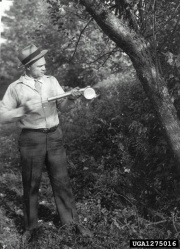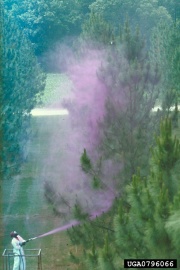Difference between revisions of "Pesticide"
| (One intermediate revision by the same user not shown) | |||
| Line 2: | Line 2: | ||
== Description == | == Description == | ||
| − | Any substance used to destroy or control pests. Nearly all pesticides are toxic to humana. A natural pesticide made from ground tobacco plants was first used in the 1763 century to kill aphids. Examples of other natural organic pesticides include [[nicotine|nicotine]], [[rotenone|rotenone]], [[petroleum|petroleum]], [[kerosene|kerosene]], [[creosote%20oil%20%28coal%20tar%29|Creosote]], and [[turpentine%20%28oil%29|Turpentine]]. Early inorganic pesticides also introduced in the 18th century include [[Paris%20green|Paris green]], [[Bordeaux%20mixture|Bordeaux mixture]], | + | Any substance used to destroy or control pests. Nearly all pesticides are toxic to humana. A natural pesticide made from ground tobacco plants was first used in the 1763 century to kill aphids. Examples of other natural organic pesticides include [[nicotine|nicotine]], [[rotenone|rotenone]], [[petroleum|petroleum]], [[kerosene|kerosene]], [[creosote%20oil%20%28coal%20tar%29|Creosote]], and [[turpentine%20%28oil%29|Turpentine]]. Early inorganic pesticides also introduced in the 18th century include [[Paris%20green|Paris green]], [[Bordeaux%20mixture|Bordeaux mixture]], [[hydrogen%20cyanide|hydrogen cyanide]] as well as less commonly used compounds containing arsenic, copper, fluorine and sulfur.. The first synthetic pesticide, [[DDT|DDT]] was developed in 1939 in Switzerland. After World War II, synthetic products proliferated including [[diazinon|diazinon]], [[aldrin|aldrin]], [[dieldrin|dieldrin]], [[chlordane|chlordane]], [[lindane|lindane]], [[parathion|parathion]], along with numerous [[fumigant|fumigants]]. By the 1960s, the devastating effects of widespread usage have prompted the regulation of the most hazardous pesticides. As such, currently used chemicals break down rapidly leaving little to no residues and include some natural compounds such as [[pyrethrum]] and [[neem oil]]. Additionally, insect growth regulators (e.g., [[methoprene|methoprene]], hydroprene, and [[fenoxycarb|fenoxycarb]]) and sex [[pheromone%20lures|pheromones]] are being used with minimal human toxicity. |
Traditional [[Mothball|Mothballs]] containing [[naphthalene]] have been replaced by other volatile repellents such as 1,4-dichlorobenzene. Moth larvae can also be killed with insecticides like [[permethrin]] or pyrethroids. | Traditional [[Mothball|Mothballs]] containing [[naphthalene]] have been replaced by other volatile repellents such as 1,4-dichlorobenzene. Moth larvae can also be killed with insecticides like [[permethrin]] or pyrethroids. | ||
Latest revision as of 11:47, 4 August 2023
Description
Any substance used to destroy or control pests. Nearly all pesticides are toxic to humana. A natural pesticide made from ground tobacco plants was first used in the 1763 century to kill aphids. Examples of other natural organic pesticides include Nicotine, Rotenone, Petroleum, Kerosene, Creosote, and Turpentine. Early inorganic pesticides also introduced in the 18th century include Paris green, Bordeaux mixture, Hydrogen cyanide as well as less commonly used compounds containing arsenic, copper, fluorine and sulfur.. The first synthetic pesticide, DDT was developed in 1939 in Switzerland. After World War II, synthetic products proliferated including Diazinon, Aldrin, Dieldrin, Chlordane, Lindane, Parathion, along with numerous fumigants. By the 1960s, the devastating effects of widespread usage have prompted the regulation of the most hazardous pesticides. As such, currently used chemicals break down rapidly leaving little to no residues and include some natural compounds such as Pyrethrum and Neem oil. Additionally, insect growth regulators (e.g., Methoprene, hydroprene, and Fenoxycarb) and sex pheromones are being used with minimal human toxicity.
Traditional Mothballs containing Naphthalene have been replaced by other volatile repellents such as 1,4-dichlorobenzene. Moth larvae can also be killed with insecticides like Permethrin or pyrethroids.
See also Attractant, Fumigant, Insecticide, and Biocide
Synonyms and Related Terms
pesticides (pl.); pest control agent; attractant; fumigant; insecticide; biocide; rodenticide
Additional Images
Resources and Citations
- MuseumPest.net at Link
- Wikipedia: Insecticide
- Wikipedia: Pest (organism)
- Nancy Odegaard, Alyce Sadongei, and associates, Old Poisons, New Problems, Altimira, Walnut Creek, CA, 2005
- Lynda A. Zycherman, J.Richard Schrock, A Guide to Museum Pest Control, FAIC and Association of Systematics Collections, Washington DC, 1988
- The American Heritage Dictionary or Encarta, via Microsoft Bookshelf 98, Microsoft Corp., 1998
- Encyclopedia Britannica, http://www.britannica.com Comment: "Pesticide." Accessed 7 Sept. 200 .




